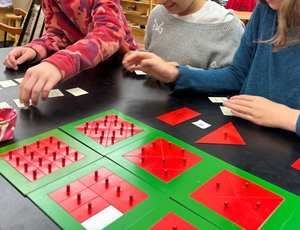Independence Day, Montessori Summer Vacation-Style
For many people in the United States, July fourth is a time for cookouts and fireworks. We get together with family and friends, enjoy our favorite potato salad, and spend some quality time in our backyards.
As adults, we know there’s a whole lot more to the day than that.
Whether you’re reading this on Independence Day, or sometime after, everything we mention below is still totally relevant and applicable. And even though we are well into summer vacation, we know many of our families never step out of Montessori mode. If that describes you, read on.
Do a deep dive into the holiday’s origins
We often rely on books to help us teach children, and this situation is no exception. A quick trip to your local library will be all you need to find an armload of age-appropriate reading material. The main points you’ll want to cover include:
- Why did early Americans feel the need to break free from England’s rule?
- What was the process like to establish the United States?
- Why do we celebrate on July fourth?
Searching for relevant pictures, articles, and videos online can help enrich kids’ experience, as can visiting historical sites if you happen to live in certain parts of the country.
Consider different perspectives
The establishment of the United States, along with large chunks of its history, aren’t exactly celebratory for some groups of people. Again, it’s helpful to lean on books to share this type of information, and especially books that are written by authors who represent the group they are teaching about.
The land we now refer to as the United States of America was inhabited by many nations of Indigenous people for thousands of years before Europeans arrived. The native perspective is that the land was stolen, and this was followed by centuries of forced relocation and mistreatment.
Another important perspective to consider is that of black Americans. The US economy originally relied heavily on the enslavement of people from Africa, and our nation’s beginnings are rooted in some pretty horrific practices that continue to have rippling effects even today. Most of us are very aware that race is at the forefront of modern American society, and the issues we still need to address have their beginnings in America’s earliest days.
Do young kids need to know every detail about what has happened in our history? Of course not. As always, keep what’s developmentally appropriate in mind. It is important to note that our children are much more aware, and studies show they develop biases much earlier than most adults realize.
Explore independence days in other countries
It would be impossible for us to list each country around the globe that celebrates an independence day; the list is just too long! Take a look at this unofficial compilation if you’re curious.
Here are a few fun highlights:
- Bastille Day is July 14 and celebrates the beginning of the French Revolution. The French love their parades and fireworks, but they also have a special tradition of opening fire stations for community dance parties.
- Bolivia begins its two-day celebration with grand parades on August 6.
- India celebrates its independence from Great Britain on August 15 by flying colorful kites.
- Who else could we imagine celebrating their independence with surfing races than Australia? Theirs takes place on January 26.
- Norway celebrates on May 17, and children are front and center. There are children’s parades around the country, as well as special parties in schools.
Help your child develop their own independence
As Montessorians, we believe all humans have the right to freedom and independence, and this includes children. Note that freedom does not mean the right to do whatever you want, whenever you want. In a community, whether it be a family or a global society, our choices should never encroach on the freedoms of others. For adults, this often takes the forms of laws or social norms. For children, it’s all about the concept of freedom within limits.
What can you do to help nurture your child’s independence? If you’ve been a Montessori parent for a little while, you may already have a basic sense of where to start. It’s a huge topic, which we could never fully summarize here at the end of this article, so instead we’ll include a few ideas and starting points.
- Learn as much as you can about child development. Utilize books, articles, and ask questions of people you know. Lean on us at the school as a resource.
- Practice observing your child. Our tendency is often to jump and help or react. Wait. Notice. Reflect. What does your child really need?
- Follow the child. We all have preconceived ideas of what our kids need and how they will progress; it’s only natural. The important bit is to be mindful of this fact, and to examine the moments in which you could potentially inject your expectations onto them, and then don’t do it. This is way easier said than done.
- Give your child choices whenever you can. This might be as simple as offering your toddler two shirts to choose from, or it might be as difficult supporting your adolescent as they reject the college you wish they would attend.
- Embrace mistakes and failures. This means on the part of you and your child. You’ll both make them, and they’re always opportunities for growth and learning. No one is born knowing everything, and it’s only through our errors that we become more complete human beings.
We hope this article has been fun and informative. Please know that we value you as important members of our community. We are grateful that you care so much about your child’s learning experience. And we wish you all a celebratory holiday with your loved ones.






